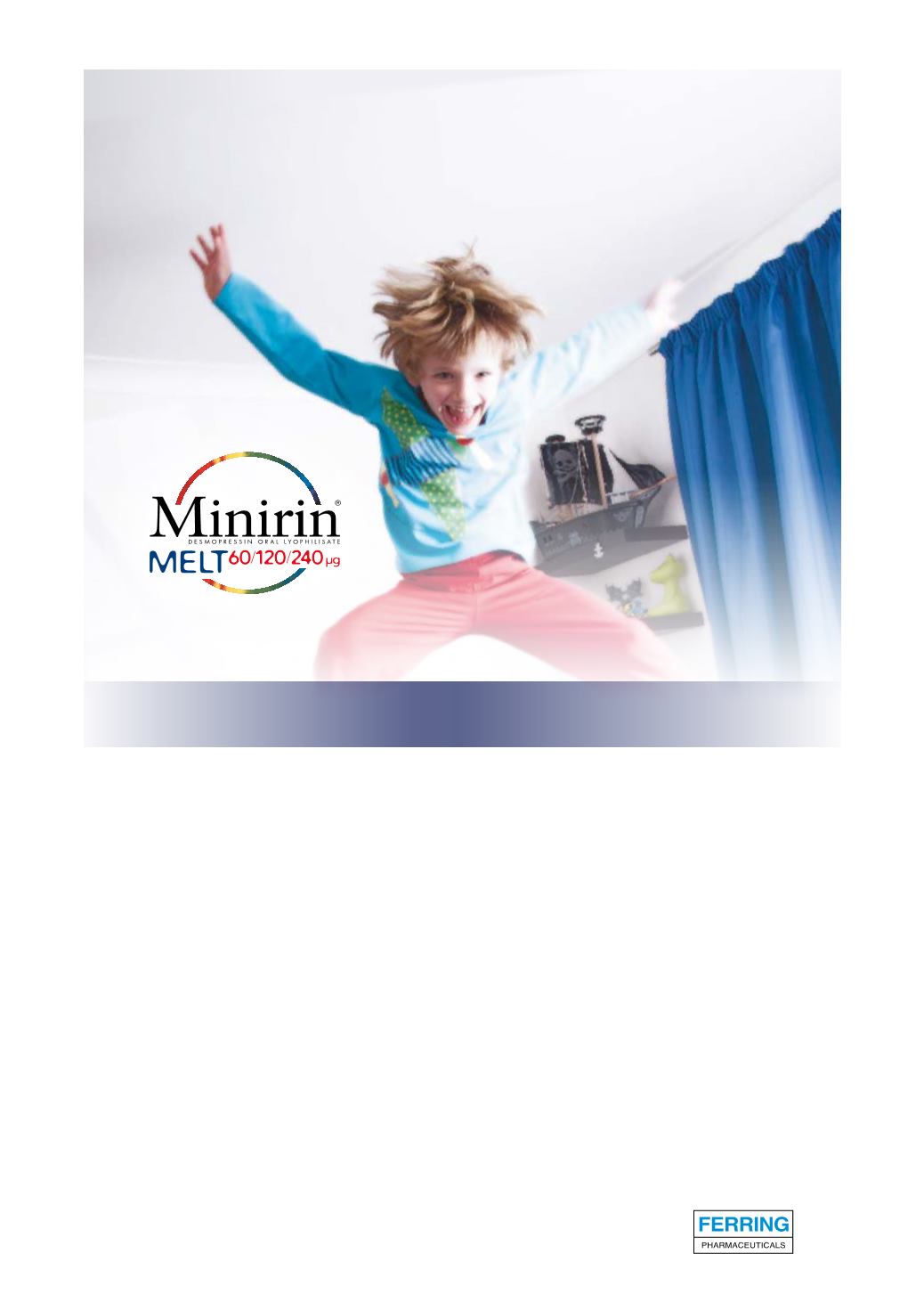

W H Y B E D W E T T I N G C A N A N D S H O U L D B E T R E A T E D
Dry nights
mean good mornings
Higher levels of compliance and efficacy
with MINIRIN Melt
than MINIRIN tablet
1
Date of preparation June 2015
MN/518/2014/CH3a
Reference:
1.Juul KV
et al.
Eur J Pediatr 2013;
172
:1235-1242
Abbreviated Prescribing Information:
Prescribing information and
indications may vary from country to country. Contact the local
Ferring representative for country specific prescribing information.
Presentation:
MINIRIN® Melt is presented as oral lyophilisates
containing 60 μg, 120 μg or 240 μg desmopressin. The oral
lyophilisates are white, round, and marked with one, two or three
drop shaped figures on one side for the strengths 60 μg, 120 μg and
240 μg respectively. MINIRIN
®
Melt also contains gelatin, mannitol
and citric acid, anhydrous.
Indications:
Central Diabetes Insipidus;
Primary Nocturnal Enuresis in patients (from 5 years of age) with
normal ability to concentrate urine; and symptomatic treatment of
Nocturia in adults, associated with nocturnal polyuria (i.e. nocturnal
urine production capacity exceeding bladder capacity).
Dosage and
method of administration:
Central diabetes insipidus:
The normal
daily maintenance dose in adults and children is 60 μg - 120 μg
administered sublingual three times daily.
Primary nocturnal enuresis:
The recommended dose is 120 μg - 240 μg administered sublingual at
bedtime.
Nocturia:
The recommended initial dose is 60 μg administered
sublingual at bedtime. The dose may be increased up to 120 μg
and subsequently 240 μg by weekly dose escalations. The initiation
of treatment in elderly (over 65 years old) is not recommended.
Contraindications:
Habitual or psychogenic polydipsia (resulting in
a urine production exceeding 40 ml/kg/24 hours); A history of known
or suspected cardiac insufficiency and other conditions requiring
treatment with diuretics; Moderate and severe renal insufficiency
(creatinine clearance below 50 ml/min); Known hyponatraemia;
Syndrome of inappropriate ADH secretion; Hypersensitivity to
desmopressin or the excipients.
Warnings:
When used for primary
nocturnal enuresis and nocturia indications, the fluid intake must
be limited to a minimum from 1 hour before until 8 hours after
administration.Treatment without concomitant reduction of fluid intake
may lead to water retention and/or hyponatraemia with or without
accompanying warning signs and symptoms (headache, nausea/
vomiting,weight gain,and, in severe cases,convulsions).
Precautions:
Severe bladder dysfunction and outlet obstruction should be considered
before starting treatment.Elderly patients and patients with low serum
sodium levels may have an increased risk of hyponatraemia.Treatment
with desmopressin should be interrupted during acute intercurrent
illnesses characterised by fluid and/or electrolyte imbalance (such
as systemic infections, fever, gastroenteritis). Precautions to avoid
hyponatraemia including careful attention to fluid restriction and
more frequent monitoring of serum sodium must be taken in case of
concomitant treatment with drugs,which are known to induce SIADH,
e.g. tricyclic antidepressants,selective serotonine reuptake inhibitors,
chlorpromazine and carbamazepine, case of concomitant treatment
with NSAIDs.
Side effects:
Primary nocturnal enuresis & diabetes
insipidus:
Common:
Headache, abdominal pain and nausea.
Very
rare:
Hyponatraemia.Nocturia:The most frequent during dosetitration:
Headache,nausea,abdominal pain,hyponatraemia,dizziness,and dry
mouth.
The most frequent in long-term
treatment:
Headache,dizziness,
peripheral oedema, micturition frequency, nausea, and weight
increase.
Pregnancy and lactation:
Caution should be exercised
when prescribing to pregnant women.The amounts of desmopressin
that may be transferred to the child are considerably less than the
amounts required to influence diuresis.
Overdose:
An overdose leads
to a prolonged duration of action with an increased risk of water
retention and/or hyponatremia.
Special precautions for storage:
Store in the original package in order to protect from moisture and
light.
Marketing authorization holder:
Ferring-Lé
č
iva,a.s.,K Rybníku
475,252 42 Jesenice u Prahy,Czech Rep.
Marketing authorization
numbers:
MINIRIN Melt 60 μg: 56/358/05-C; MINIRIN Melt 120 μg:
56/359/05-C.MINIRIN Melt 240 μg:56/360/05-C.
Date of revision of
the text:
MINIRIN Melt 60 μg/120 μg/240 μg
:22.8.2012.Onmedical
prescription.Reimbursed from Healthcare insurance.
Legal category:
POM.Ferring International Center S.A.Chemin de laVergognausaz 50,
1162 Saint-Prex, Switzerland / Ferring Pharmaceuticals CZ, s.r.o., K
Rybníku 475, 252 42 Jesenice u Prahy, Czech Rep., Phone: +420
241 041 111.
MINIRIN Melt 240 µg is not on a market in the Czech Republic.
For full Product Information please contact: Ferring
Pharmaceuticals CZ, s.r.o., K Rybníku 475, 252 42 Jesenice u
Prahy, Czech Rep., Phone: +420 241 041 111.










